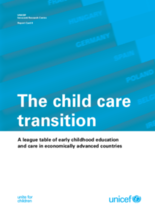A great change is coming over childhood in the world’s richest countries. Today’s rising generation is the first in which a majority is spending a large part of early childhood in some form of out-of-home child care. At the same time, neuroscientific research is demonstrating that loving, stable, secure, and stimulating relationships with caregivers in the earliest months and years of life are critical for every aspect of a child’s development. Taken together, these two developments confront public and policymakers in OECD countries with urgent questions. Whether the child care transition will represent an advance or a setback – for today’s children and tomorrow’s world – will depend on the response.
This Report Card discusses the opportunities and risks involved in the child care transition, and proposes internationally applicable benchmarks for early childhood care and education – a set of minimum standards for protecting the rights of children in their most vulnerable and formative years. The report shows which countries are currently meeting the suggested standards, and summarizes this first attempt to evaluate and compare early childhood services in the 25 OECD countries in which data have been collected.
The Report Card advances the idea of an internationally applicable set of minimum standards by which the rights of young children might be protected as the transition to child care gathers momentum. The 10 benchmarks suggested, drawn up in consultation with government officials and academic experts from OECD countries in Asia, Europe, and North America, with additional input from both UNICEF and the World Bank, represent a first attempt towards evaluating and comparing early childhood services.

